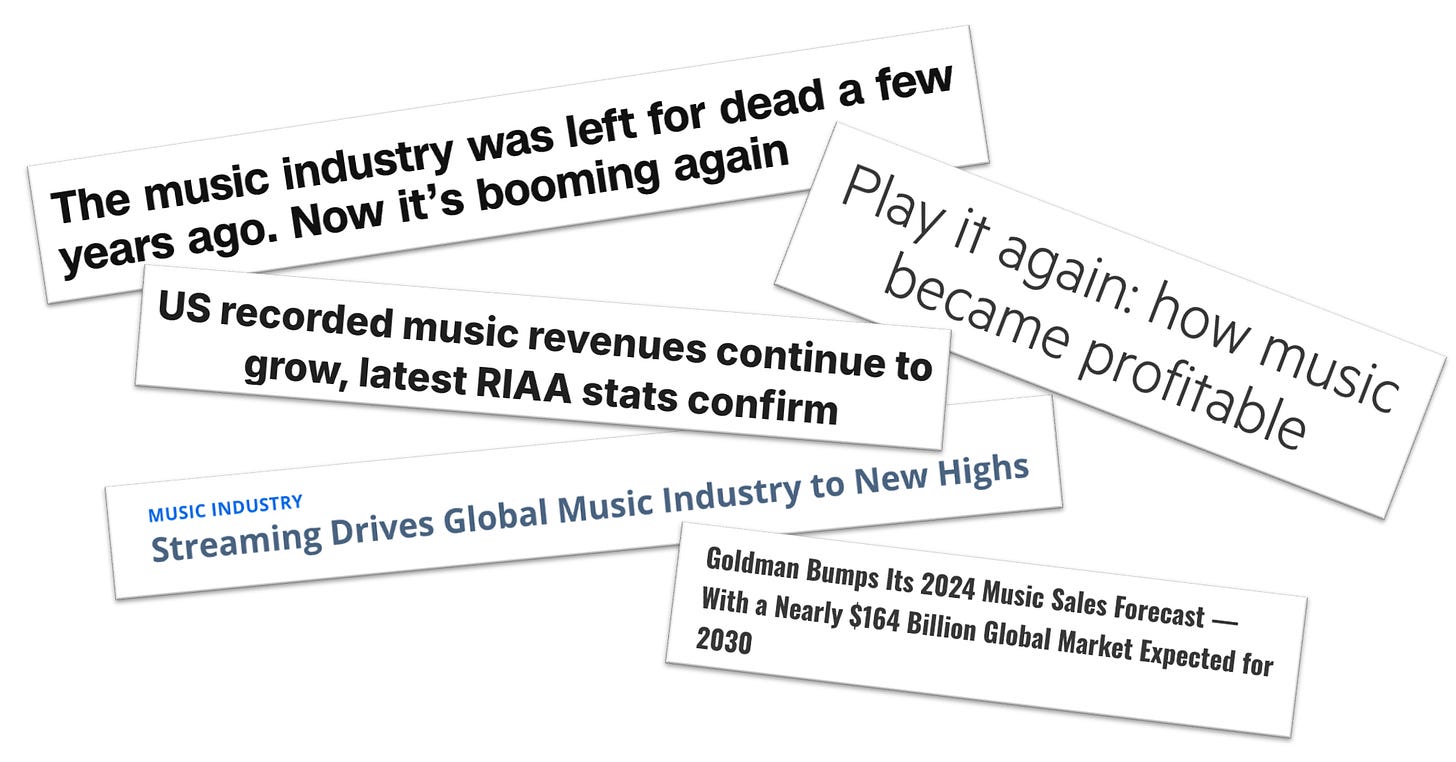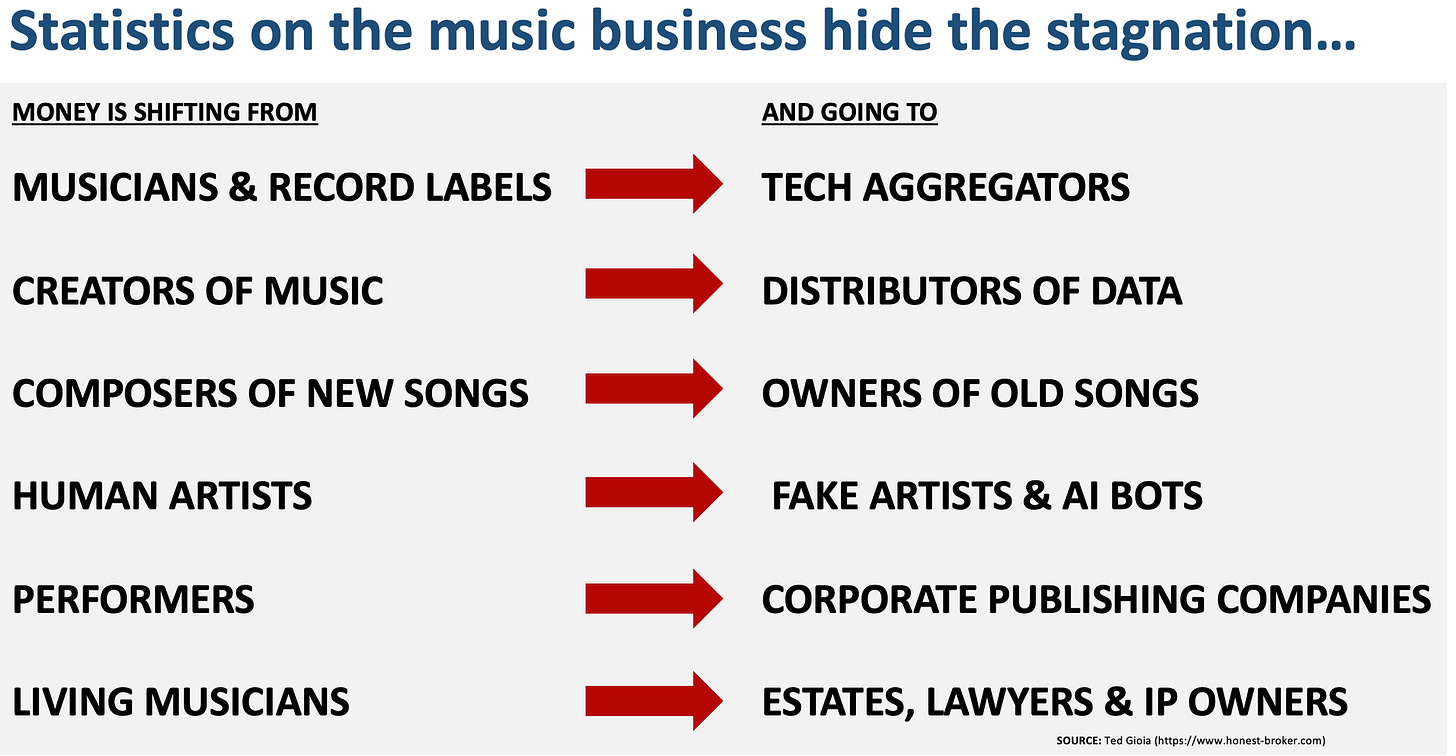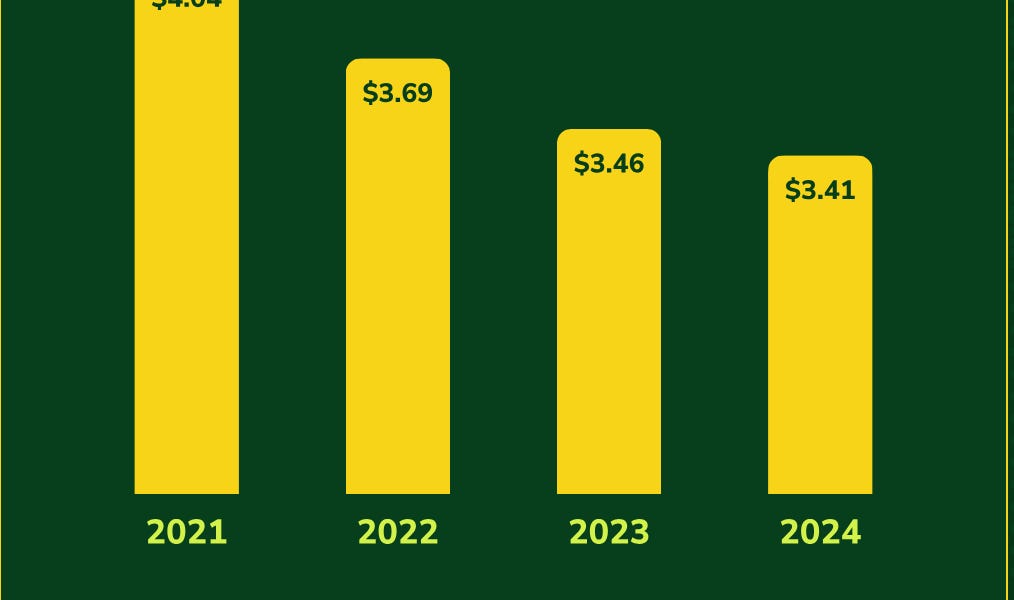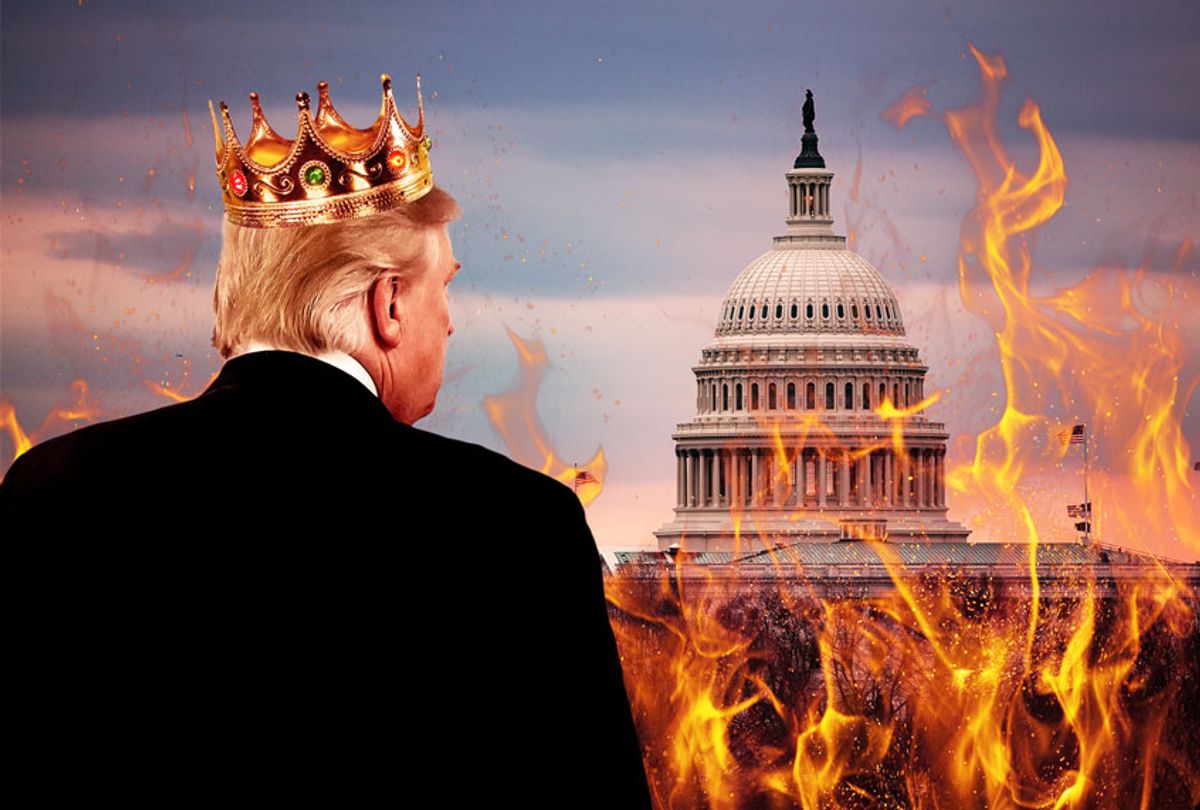I often see headlines like these—proclaiming a new Golden Age for Music.

What a wonderful time for a person like me to be alive! Everyone is having a good year. Everyone will see the sun shine.
But there’s still a tiny problem. When I talk to actual musicians, they tell me the exact opposite.
They’re struggling—more than ever before. Even established artists feel the pinch.
That’s why my favorite headline on the topic is this one: (courtesy of Billboard):
You can feel the irritation from the headline. Why are these pesky musicians whining? They should be grateful—and they’re griping instead.
According to Billboard, it’s a “paradox.” It’s “difficult to solve.”
But, of course, it isn’t difficult at all. That’s because….

Yes, somebody is making money from music—just not the people who create it.
There’s never been a better time in history to be an intermediary, a middleman, a hanger-on, an aggregator, a shyster.
For a guitarist or keyboardist or singer, not so much.
If you just look at the total size of the music business, you miss these shifts at the grass roots level. And that’s where the real action takes place.
Nobody in the power structure wants to talk about this.
I’ve seen hundreds of articles about the new Golden Age of Music that skip over these ugly details below the surface. Are the journalists ashamed of the truth?Are they kowtowing to advertisers? Or are they just ignorant?
If a parasite attached to your body gets bigger and bigger, that doesn’t mean you’re healthy. It’s thriving by destroying you. Something similar is happening in the culture right now, especially the music culture.
I’m reminded of a meeting where an executive told me: “This would be a great business if it weren’t for the customers.” He said it with a straight face—and I’m still not sure if he was serious or joking.
It’s absurd. Yet a similar attitude is now pervasive inside the music business. It would be a great business if it weren’t for the musicians.
Would they please just stop bellyaching?
What’s scary is that these same industry leaders are hatching plans to reach this crazy goal. For them, the Golden Age of Music involves AI bots making songs on command—and never whining.
If you want to understand the new business model in music, check out this chart—released a few days ago by Duetti in their Music Economics Report.
The tech platforms are making more, and paying musicians less.
The math couldn’t be simpler, and this certainly is no “paradox”—it’s called a squeeze. That’s the usual name when a stronger person forces you to pay more for less.
Let me also point out the obvious. Musicians aren’t the only victims here—the audience is also getting squeezed. You are also paying more and getting less.
Instead of focusing on exciting new music, Spotify prefers to serve up AI slop (acquired on the cheap), fake artists, and lots of old songs.
This is a stark contrast to video streaming—where Netflix, Apple, Amazon, Disney, and others invest tens of billions of dollars annually in creating new films and series.
Music streamers don’t like creating content (that word, ugh!). Other people need to make those risky investments—not the streaming platform.
Of course, music streamers must eventually pay royalties. But they work hard to minimize those payments (hence the above trendline). They have opaque systems that make it hard to figure out the cash flows—and meanwhile manipulate the system with pay-for-play and other schemes.
And don’t think that Spotify is the only culprit. Here are the combined figures for nine streaming platforms (again from Duetti):
The squeeze is getting tighter each year.
Maybe there’s some good news here. That’s because major record labels might finally wake up from their nap.
After all, major labels are losing streaming market share—and it’s getting worse each year.
Here’s the trendline. The direction is clearly downward.
Is the rest of the money going to indie labels? Or to AI and fake artists? Who knows?
But things are so bad at Warner Music that its entire recorded music business is shrinking 15% year-on-year.

They still pretend that they have a loving, caring relationship with Spotify. But that can’t be true, can it?
The news stories don’t tell you much. Warner just cut a new deal with Spotify that “delivers new benefits”—but “financial details weren’t disclosed.”
Universal Music also reached a new agreement with Spotify three weeks ago. Both CEOs made positive comments, but the press release “did not note specific details on the deal’s value or its exact length.”
Meanwhile Spotify has announced that it is “doubling down” on music. I have no idea what that means—but, given what I know about this company, it sounds ominous.
What’s really happening here?
My guess is that record labels are also feeling the squeeze. But they don’t have the courage to fight back.
The most clearcut evidence of what major labels really think can be found in their rapid shift from the recording business to the music publishing business.
If the record business was really booming again, they wouldn’t be doing that.
I’d like to see them take a tougher stance. But I fear the time to do that may have just passed.
Instead of bowing and scraping, they should cut off Spotify and launch their own streaming platform—run as a cooperative of labels and artists.
That’s an actual long term solution, and benefits everybody who loves music. The only losers are the technocrats who are implementing the squeeze.
Alas, the bosses at these labels don’t have the courage for this kind of bold initiative. But they will later regret that they didn’t put up a fight.
Owning the publishing rights to old songs merely delays the inevitable. Over time these songs lose both their popularity and their copyrights. They are, at best, dying assets.
And it will get worse as Spotify and other music streamers learn how to replace human music with AI slop. They are already doing this—and with more success than anyone anticipated.
Unless record labels develop exciting new human talent, they will have no response to these initiatives. Musicians and listeners will both suffer from the resulting creative stagnation.
The situation is so bad that even Spotify’s senior execs are selling their shares. And for good reason—there’s growing evidence that the streaming music audience might now be shrinking.
Even the squeezers are afraid of getting squeezed. That’s how bad it’s gotten.
But I’m not surprised.
You can’t keep serving up old songs, fake artists, and AI slop and expect that the public will get excited about music streaming.
The only real excitement in music now is live performance. People don’t care about records anymore, but they will still talk about Taylor Swift’s tour or the Super Bowl halftime show.
Has any recent album created comparable buzz? If I judge by the Grammy ratings—down again—the public is not engaged by the recording industry. Only 15.4 million people watched this year, although this event once drew 50 million viewers.
That’s not a decline. It’s a total collapse.
This is what cultural stagnation looks like, my friends. And it will get worse, not better—unless something big changes soon.
But how ironic if streaming destroys the record labels. And then ruins the streamers too.
For the time being, subscription prices increases hide the damage done. But they can’t hide it forever. The people who created this mess will eventually pay a price for their carelessness and greed.
And then what happens?
The last people standing might just be the musicians—and, of course, those fans who genuinely care about music. If we’re lucky they will build something new on the ruins.









:max_bytes(150000):strip_icc():focal(749x0:751x2)/jerry-butler-071524-4-3473f163a1dc42699d5c0653cbff10bb.jpg)




